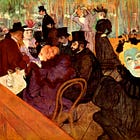Fasting has been trendy for some time now. From Silicon Valley nerds, to crunchy Whole Food moms, to the Übermenschen body bros, sometime in the 2010s it dawned on these disparate bands of weirdos that ancient people weren’t complete idiots after all. You’ve seen the articles:
10 MIND-BLOWING BENEFITS TO FASTING!
Of course, discussions rarely stray beyond physiological effects. So it’s with considerable interest that I’ve watched the shift towards talk of what I’ll be calling digital fasting as the aftermath of the (digitally mediated) pandemic becomes more apparent. Digital fasting cannot as easily as easily disconnected from the mind—though the term dopamine fasting is an attempt to return to a purely physiological framework.
As you know, Poetry is the primary focus at Silver Door, and you simply can’t make, participate in, or fully appreciate poetry with a screen in your face. In J.Z’s recent piece we’re reminded that poetry needn’t be restricted even to the page; beautiful phrases inscribed in stone, doors, furniture, have to be reconsidered.
To do this, to create beautiful things, to even just adorn our homes, requires rumination, “free” time, even boredom. Our screens, designed to stimulate, are antithetical to this.
So while it’s a given that digital/informational overload, aka overstimulation, is a problem, how and at what scale this can be “solved” is another question. Part of the work will involve socially coding certain behaviors as shameful (I am as guilty as the next man at times, for the record).
Still, specific practices, techniques, will also need implemented even if this can be achieved.
Ruth Gaskovski is doing fantastic work on her Substack tackling this issue from a practical perspective:
What is missing from most all discussions of digital fasting or digital detoxing can be found in a word from the title above: Pilgrimage.
Digital fasting, like any fasting, will remain ultimately fruitless if it isn’t in service towards something higher. The vertical and the horizontal need to be integrated, the higher things along with one’s fellow travelers. To not know where we’re heading and with whom is the definition of lost.
My Metropolitan (for non-Orthodox a metropolitan is basically a bishop with special honors and responsibilities), Metropolitan Saba of All North America, made a statement recently which led me to undertake this short series on digital fasting:
We need to introduce ascetic practices related to the use of modern media and information consumption. We might consider setting specific times for infomration consumption, limiting it before and afer receiving Holy Communion an don fasting days, utilizing this time for prayer, beneficial reading, or acts of love. Being human, created in the image of God, demands that we live with inner freedom that makes us masters of our actions, rather than followers led by exernal influences.
Last week, Silver Door changed it’s mail date for weekly poems from Wednesday to Thursday. Wednesdays and Fridays are fasting days for Orthodox Christians and this will now be extended into the digital realm.
The calendar, particularly a liturgical calendar, is a great gift we’ll explore next week.





